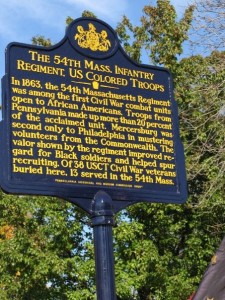This profile was published in “Grand Review Times: A Call for the Descendants of USCT Troops from Camp William Penn 1863 to the Harrisburg Grand Review, 1865,” a supplement that appeared in the March 22, 2010 issue of ShowcaseNow! Magazine. ““Grand Review Times” is avalible for download as a PDF file here. (Adobe Reader must be installed on your computer in order to read this document.)
Christopher Frisby, a native of Mercersburg, is a descendant of a number of soldiers who served in the United States Colored Troops during the Civil War. Among them is his great-great-great grandfather, Hezekia Watson who served as a member of Company I of the 54th Massachusetts Regiment. This is the regiment spotlighted in the film, Glory, starring Matthew Broderick, Morgan Freeman, and Denzel Washington. Watson was wounded in the Battle of Fort Wagner on July 18, 1863, the same battle chronicled in the film. Born in Mercersburg, Watson also died there and was buried in the town’s African American burial ground, Zion Union Cemetery, a three-acre property in the Franklin County community that rests along the Mason-Dixon Line. The cemetery was incorporated in 1876, and was funded in part by the pension funds earned by Mercersburg’s USCT veterans. 38 USCT Civil War veterans are buried here and records show that 13 of these men served in the 54th Massachusetts.
Frisby holds bachelor’s and master’s degrees in history and relates that his other great-great-great grandfather buried at Zion Union, Robert Henry Stoner, Sr., was a member of the U.S. Colored Infantry. Stoner was born in 1838 and served in Company F of the 8th U.S. Colored Volunteer Infantry. He was discharged as a corporal on June 24, 1865. He is also related to Thomas Cuff who served in the 54th Massachusetts and William Cuff who served in the 55th Massachusetts.
Frisby has been one of the leaders in the conservation effort to bring a proper dignity back to the Cemetery and has worked with many other local people including boy scouts and girl scouts to improve the site partly as a memorial to this important chapter of history.
“Having a sense of the history of this area and of my ancestors,” Chris Frisby notes, “helps root me in my community. It helps explain the process of how all of us have arrived to our current situations in the world. It’s a comfort to know that these men walked the same streets, played in the same fields, and lived in the same buildings as we do today.
“When I see the names of property owners in this area on 19th century maps, I recognize current family names and it helps me understand how black and white citizens interacted then. I am proud of my ties to the past and the work I have done in the present to see that the past is honored and that it lives on as a foundation for what is to come in the future. I encourage others in southcentral Pennsylvania and elsewhere to explore their family histories, to uncover their Civil War ties, and to begin to think about how the past informs the present.”

